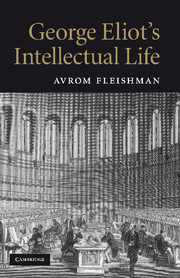Book contents
- Frontmatter
- Contents
- Acknowledgements
- Preface
- Introduction
- 1 The “Evangelical”: starting out in a Christian culture
- 2 The Apostate: moving beyond the Christian mythos
- 3 The Journalist: editing, reviewing, shaping a worldview
- 4 The Germanist: balancing the counterweight of German thinkers
- 5 The Novelist: mixing realism, naturalism and mythmaking
- 6 The Historian: tracking ideals – utopian and national – in Romola and The Spanish Gypsy
- 7 The “Radical”: taking an anti-political stance in Felix Holt
- 8 The Encyclopedist: transcending the past in Middlemarch
- 9 The Visionary: transmitting ideals in Daniel Deronda
- 10 The Intellectual: cultural critique in Impressions of Theophrastus Such
- Notes
- Works cited
- Name index
9 - The Visionary: transmitting ideals in Daniel Deronda
Published online by Cambridge University Press: 05 April 2010
- Frontmatter
- Contents
- Acknowledgements
- Preface
- Introduction
- 1 The “Evangelical”: starting out in a Christian culture
- 2 The Apostate: moving beyond the Christian mythos
- 3 The Journalist: editing, reviewing, shaping a worldview
- 4 The Germanist: balancing the counterweight of German thinkers
- 5 The Novelist: mixing realism, naturalism and mythmaking
- 6 The Historian: tracking ideals – utopian and national – in Romola and The Spanish Gypsy
- 7 The “Radical”: taking an anti-political stance in Felix Holt
- 8 The Encyclopedist: transcending the past in Middlemarch
- 9 The Visionary: transmitting ideals in Daniel Deronda
- 10 The Intellectual: cultural critique in Impressions of Theophrastus Such
- Notes
- Works cited
- Name index
Summary
Middlemarch all but ends with the sentence: “Every limit is a beginning as well as an ending.” George Eliot's next novel, Daniel Deronda (1876), opens with the sentence, “Man can do nothing without the make-believe of a beginning.” Something has happened to make Eliot believe that to make a new beginning, it is necessary not merely to take up from the previous limit but to introduce a “make-believe,” a new, even arbitrary constituent dropped into the super-organism. It is another resource of Middlemarch to provide us with a hint of her procedure here. That encyclopedic fiction did for the totality of an English society (not the one present at time of writing but a past one) what Balzac before and Zola afterward required a whole shelf of novels to do. After such fulfillment, it would be necessary to go beyond prior achievement in a new mode. An additional, even alien element was needed for a novel that might deal with the England of the present as its predecessor had done for the past. Why not an Englishman who discovers he's not English at all or entirely, but an outsider, an “Italian with white mice” or, to use the pungent phrase of one Middlemarcher, “a grafting of the Jew pawnbroker” (lxxi, 707). A somewhat arbitrary beginning, but pregnant with possibilities.
- Type
- Chapter
- Information
- George Eliot's Intellectual Life , pp. 190 - 217Publisher: Cambridge University PressPrint publication year: 2010



